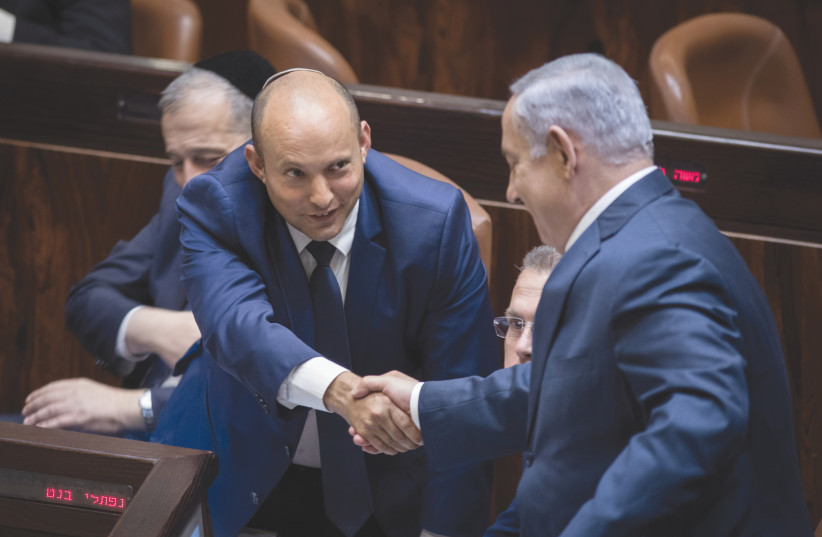The first 12 minutes and 20 seconds of Prime Minister Naftali Bennett and Foreign Minister Yair Lapid’s news conference on Monday evening announcing the end of the current government was an impressive display of grace and political magnanimity rarely seen in these parts.
Rarely seen, in fact, in any parts.
If not for the last 14 seconds, the display would have been perfect. But the last 14 seconds, the last 14 seconds of Lapid’s brief comments, gummed up the works, if only a bit.
But first to the positive.
Bennett-Lapid press conference: The positives
Bennett did something almost unheard of in Israeli politics - he wilfully gave up the reins of power, and willfully released his clutch on the horns of the prime ministerial altar. Who does such a thing in Israel? Who voluntarily steps away?

Now there are those saying that he had no choice, that the government was going to fall anyway – if not this week, then next week; if not next week, the week after.
True, but Bennett could have tried to hold on, tried to run out the clock until the end of the Knesset session at the end of next month, at which point he would have bought himself a couple more months in the Prime Minister’s Office while the Knesset was in its long summer recess. Who knows? Maybe in the meantime a crisis would have developed that he could have leveraged into political capital and a new lease on prime ministerial life.
But he chose not to. Because to do so would have thrust Israel into a political twilight zone where nothing could move, nothing could be accomplished, and where inordinate energy would be expended trying to figure out which MK would eventually bring down the government, and what price would be needed to keep him or her from doing so.
It’s tough to run a country with that degree of uncertainty: knowing that the government is teetering on the brink of collapse, but not knowing exactly what will push it over, or when. So rather than putting the nation through that wringer, Bennett opted to put the government out of its misery, at no small personal price.
That was one act of magnanimity he displayed.
Another was the gracious manner in which he spoke of Lapid, whom on several occasions he termed “my friend.” And he seemed to genuinely mean it, though sitting in the same government, Bennett and Lapid are still political rivals, heads of competing parties. Yet Bennett had no qualms about heaping praise on the man slated to replace him.
“I stand here with my friend, Yair Lapid, who will soon take over as prime minister, in accordance with the agreement between us. I got to know him during the most important moments over the past year. We worked together. Yair embodies virtues of decency and responsibility, he is a ‘mensch,’ and represents a significant public in Israel,” he said.
When was the last time you heard one politician speak that way about another politician in his own party, let alone about a politician in a rival one?
And the third, perhaps most impressive, demonstration of Bennett’s magnanimity that evening came when Bennett said he would honor his commitment and rotate as prime minister with Lapid immediately after the Knesset is dissolved, something that could happen as early as next week.
What makes this act so impressive is that it stands in such stark contrast to Bennett’s predecessor, Benjamin Netanyahu, who did everything he could to squirm out of a rotation agreement he signed with Benny Gantz that led to the establishment of Netanyahu’s last government.
Netanyahu promised no “shticks and tricks” concerning that agreement, but pulled both.
Bennett, by contrast, simply lived up to his word, as if that was just the natural thing to do – you make commitments, and then you live up to them. Maybe keeping one’s word should not be that big a deal, but it definitely is in this country’s political climate.
The graciousness of the evening spilled over in the first 75 seconds of Lapid’s comments, when he praised the prime minister using uncommon language when speaking of political rivals:
“I want to thank my partner, Prime Minister Naftali Bennett, for the responsibility he demonstrated today, for the fact that he put the country before his personal interest. I want to thank him for one more thing – for his friendship, I love you very much. Our friendship faced tests and obstacles, but always succeeded. He is an important, original and brave Israeli leader, and I have no doubt that his place is in the leadership of the state for many years to come.”
Those are the types of words politicians usually speak at eulogies for recently deceased colleagues or rivals, but which are rarely spoken in the present tense.

Bennett-Lapid press conference: The negative
And while gracious words such as these are very welcome in the fractured reality of Israeli politics, they were not the only words Lapid spoke.
That brings us to the last 14 seconds.
If until that point it seemed like a new, generous spirit was wafting through Israeli politics, then came this from Lapid: “What we need to do, also today, is to return to the idea of Israeli unity. Not to allow the forces of darkness to break us up from within, to remind ourselves that we love one another, love the state, and only together will we win.”
His comments about the “forces of darkness” were as unnecessary as they were jarring. Jarring because they stood in such stark contrast to the spirit of the comments just uttered, and unnecessary because Lapid does no one any favors, including himself, by calling those in the other camp the “forces of darkness.”
As the country embarks on yet another election campaign, the fifth in three-and-a-half years, no one benefits by framing the upcoming election as a competition between the “forces of light” vs “the forces of darkness,” between the forces of good and the forces of evil. The political math shows it is likely once again that after the election, parties with diverse ideologies will again have to work together to form a coalition.
Who knows? Maybe Lapid will need to work with some of those parties sitting today in the opposition. As such, the soon-to-be acting prime minister could do better than start off by labeling them “forces of darkness.” That type of language does little to engender the goodwill that may very well be necessary to form a new government a few months down the line that will have more than a one-seat majority.
